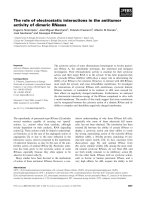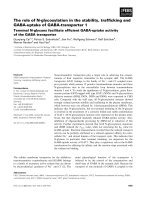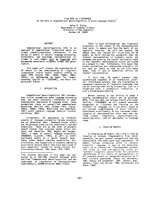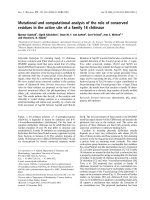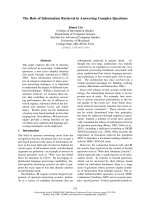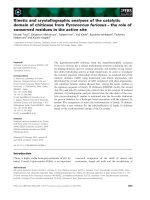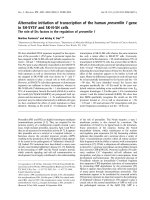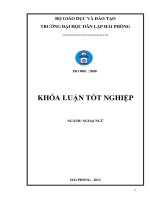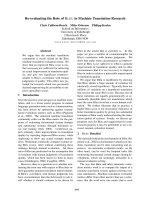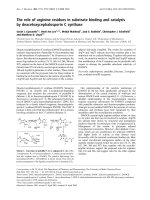The role of international agreements in environmental conservation and its implication to Vietnam
Bạn đang xem bản rút gọn của tài liệu. Xem và tải ngay bản đầy đủ của tài liệu tại đây (904.54 KB, 179 trang )
VIETNAM NATIONAL UNIVERSITY
FACULITY OF ECONOMIC
YASUKATA FUKAHORI
THE ROLE OF INTERNATIONAL AGREEMENTS IN
ENVIRONMENTAL CONSERVATION AND ITS IMPLICATION TO
VIETNAM
Major: Political Economy
Code: 62.31.01.01
DOCTORAL PHILOSOPHY OF ECONOMICS
Advisor: 1. Associated Professor, Doctor Phi Manh Hong
2. Doctor Phung Xuan Nha
HaNoi, 2008
VIETNAM NATIONAL UNIVERSITY, HANOI
COLLEGE OF ECONOMIC
YASUKATA FUKAHORI
THE ROLE OF INTERNATIONAL AGREEMENTS IN
ENVIRONMENTAL CONSERVATION AND ITS IMPLICATION TO
VIETNAM
Major: Political Economy
Code: 62.31.01.01
DOCTORAL PHILOSOPHY OF ECONOMICS
Advisor: 1. Associated Professor, Doctor Phi Manh Hong
2. Doctor Phung Xuan Nha
HaNoi, 2008
CONTENTS
Page
Introduction ………………………………………………………………………
1
Chapter I: Economic Theories Related to Environmental Conservation……….
14
1.1.
Theories of Common Pool Resources ……………………………………
14
1.2.
Theories of Collective Actions and International Agreements …………….
23
1.3.
Coase Theorem …………………………………………………………
25
1.4.
Game Theory ……………………………………………………….……
26
1.5.
Other Economic Theories …………………………………………….…
31
1.6.
Application of Economic Theories to Environmental Conservation……….
36
1.6.1.
Sustainability and Budget Line – Case Study for Forest Conservation…….
36
1.6.2.
Game theory scenarios and possible contribution arrangements of
international agreements ………………………………………….……….
46
1.7.
Summary of Results ………………………………………………….……
88
1.8.
Recommendations …………………………………………………….…
90
Chapter II: Environmental Conservation in Relation with Trade, ODA and
Sustainable Development ………………………………………… …………….
92
2.1
Trade Agreements and Environmental Issues ………………………… ….
92
2.1.1.
The New Politics of Trade ……………………………………… ………
92
2.1.2.
Trade under Commodity Agreements and Environmental Conservation…
96
2.1.3.
WTO Dispute Settlement Mechanism and Environmental Conservation
100
2.2.
Global Environmental Issues ……….……………………………………
101
2.2.1.
Issues and Problems related to Global Environmental Conservation……….
102
2.2.2.
World Summit for Environment ……………….………………………….
103
2.3
ODA and Environmental Issues …………………………………………
106
2.3.1.
Trade and ODA …………………………………….……………………
106
2.3.2.
ODA and Environmental Issues …………………….…………………….
107
2.3.3.
Problem of International Aid …………………………….………………
107
2.3.4.
Private Sector ……………………………………………………………
109
2.3.5.
Transparency …………………………………………………….……….
109
2.3.6.
The Problem of Sovereignty and Economic Forces ………………………
110
2.3.7.
Capacity Building, Education, and International Treaties ………….……
110
2.4.
Sustainable Management of Environmental Natural Resources ……….….
111
2.4.1.
Definitions of Sustainable Development ………………………………….
111
2.4.2.
Economic growth for local welfare and conservation - Sustainable
Development
112
2.4.3.
Problems Causing Sustainable Management …………………… ………
114
2.5.
Environmental Conservation and International Agreement ……………….
116
2.5.1.
International Negotiation on Environmental Conservation ………………
116
2.5.2.
Fund Raising under the Existing International Agreements ……………….
117
2.5.3.
ITTO and Forest Conservation …………………………………………….
118
2.5.4.
Limit in conservation by an international agreement organization …………
130
2.6
Experiences in Other Countries…………………………………………….
132
2.6.1
Japan ………………………………………………………………………
132
2.6.2
South Korea ……………………………………………………………….
133
2.6.3
China ………………………………………………………………………
133
Chapter III: Issues Related to Vietnam ………………………………………….
137
3.1.
The New Trade Debate and Its Implication to Vietnam …………………
137
3.1.1.
Vietnam’s New Membership of WTO ……………………………………
137
3.1.2.
New Politics of Trade and Vietnam ………………………………………
138
3.1.3.
CDM and Vietnam ………………………………………………………
139
3.1.4
ODA and Environment/Trade Issues for Vietnam…………………………
141
3.2.
Application of Economic Theory - Implication of ITTO Mechanisms to
Vietnam - ………………………………………………………………….
142
3.2.1.
Scenario 1 …………………………………………………………………
144
3.2.2.
Scenario 2………………………………………………………………….
151
3.2.3.
Analysis of results …………………………………………………………
156
3.2.4.
Summary of Games ……………………………………………………….
157
3.3.
Experiences in Other Countries for the comparison with Vietnam…………
160
3.2.1.
Japan ………………………………………………………………………
160
3.2.2.
South Korea ………………………………………………………….……
160
3.2.3.
China ……………………………………………………………………
160
3.2.4.
Lessons from other countries ……………………………………………
161
Conclusion ……………………………………………………………………….
162
List of reference materials ………………………………………………………
168
LIST OF FIGURES, BOXES AND TABLES
Page
Chapter I: Economic Theories Related to Environmental Conservation
15
Figure 1.1.
Supply=Demand Relation for Normal Private Goods
18
Figure 1.2.
Supply=Demand Relation for Public Goods
18
Figure 1.3.
Total Cost and Total Revenue Relation (Private goods)
20
Figure 1.4.
Marginal Cost and Average Revenue Relation (Private Goods)
20
Figure 1.5.
Total Cost and Total Revenue Relation (Public Goods)
21
Figure 1.6.
Marginal Cost and Average Revenue Relation (Public Goods)
21
Figure 1.7.
Natural Resource Budget Line and Sustainable Level
23
Box 1.1.
International Agreement and Game Theory
29
Figure 1.8.
Contribution and Depletion Relation
30
Figure 1.9.
Export Quota Allocation and Market
34
Figure 1.10.
Elasticity of Substitution (High Elasticity)
35
Figure 1.11.
Elasticity of Substitution (Low Elasticity)
35
Figure 1.12.
Current and Possible Future Budget Lines
37
Figure 1.13.
Long-term Tropical Forests Depletion Perspectives
38
Figure 1.14.
The case sustainable level is set at 2000
41
Figure 1.15.
The case sustainable level is much higher than present level
41
Figure 1.16.
Contribution and Sustainable Level of Resource Depletion
(Case 1)
44
Figure 1.17.
Contribution and Sustainable Level of Resource Depletion
(Case 2)
44
Figure 1.18.
Contribution and Sustainable Level of Resource Depletion
(Case 3)
45
Figure 1.19.
Relation between Fund and Global Environmental Value
/ Scenario 1 (Gv = 2*(Cp + Pp) - 1500)
48
Box 1.2.
Contribution to the Fund and Game Theory /Scenario 1 (Gv =
2(Cp + Pp) - 1500)
49
Box 1.3.
Same environmental value for both consumers and producers
53
Box 1.4.
No environmental value for producers
54
Box 1.5.
Half environmental value for producers
55
Box 1.6.
Contribution to the fund and Game Theory /Scenario 1b (Gv =
2(Cp + Pp) - 1500)&(Pv = Gv - Pp + Cp)
57
Box 1.7.
Same environmental value for both consumers and producers
59
Box 1.8.
No environmental value for producers
60
Box 1.9.
Half environmental value for producers
61
Figure 1.20.
Contribution and Sustainable Level of Depletion (Case 4: Both
consumers and producers share responsibility)
63
Figure 1.21.
Budget Line of the Fund
66
Figure 1.22.
Budget Line Shift by Producers' Efforts
66
Figure 1.23.
Relation between contribution and Global Environmental
Value /Scenario 2 (Gv = Cp + Pp)
68
Figure 1.24.
Relation between contribution and Global Environmental
Value /Scenario 3 (Gv = Cp + Pp -1500)
69
Box 1.10.
Contribution to the fund and Game Theory /Scenario 2 (Gv =
Cp + Pp)
71
Box 1.11.
Same environmental value for both consumers and producers
72
Box 1.12.
No environmental value for producers
73
Box 1.13.
Half environmental value for producers
74
Box 1.14.
Contribution to the fund and Game Theory /Scenario 3 (Gv =
Cp + Pp -1500)
75
Box 1.15.
Same environmental value for both consumers and producers
76
Box 1.16.
No environmental value for producers
77
Box 1.17.
Half environmental value for producers
78
Box 1.18.
Contribution to the fund and Game Theory /Scenario 2b (Gv =
Cp + Pp)&(Pv = Gv -Pp + Cp)
80
Box 1.19.
Same environmental value for both consumers and producers
81
Box 1.20.
No environmental value for producers
82
Box 1.21.
Half environmental value for producers
83
Box 1.22.
Contribution to the fund and Game Theory /Scenario 3b (Gv =
Cp + Pp -1500)&(Pv = Gv - Pp + Cp)
84
Box 1.23.
Same environmental value for both consumers and producers
85
Box 1.24.
No environmental value for producers
86
Box 1.25.
Half environmental value for producers
87
Chapter II: Environmental Conservation and Trade ……………….
92
Table 2.1.
Developing Countries' Share in Total Exports of Selected
99
Table 2.2.
Total forest area, related land area and population in 1995
120
Table 2.3.
Forest cover change for developing countries
123
Table 2.4.
Current and projected consumption of forest products
(1990-2010)
124
Table 2.5.
Natural forest and Net Plantations in developing countries
125
Table 2.6
Forest cover state and change by ecological zone for tropical
countries
126
Chapter III: Issues Related to Vietnam ……………………………….
132
Figure 3.1.
Relation between the Bali Partnership Fund and Vietnam
Scenario 1 (GVv = Cp + Vp)
146
Box 3.1.
Contribution to the Bali Partnership Fund and Game Theory /
Scenario 1: Vietam (GVv = Cp + Vp)
147
Box 3.2.
Same environmental value for both Vietnam and consumers
148
Box 3.3.
No environmental value for Vietnam
149
Box 3.4.
Half environmental value for Vietnam
150
Box 3.5.
Contribution to the Bali Partnership Fund and Game Theory
/Scenario 2: Vietnam (GVv = Cp + Vp)&(Vv = GVv -Vp +
Cp)
152
Box 3.6.
Same environmental value for both Vietnam and consumers
153
Box 3.7.
No environmental value for Vietnam
154
Box 3.8.
No environmental value for Vietnam
155
Abbreviations
AFTA ASEAN Free Trade Area
APEC Asia Pacific Economic Cooperation
ARF ASEAN Regional Forum
ASEAN Association of East Asian Nations
ASEM Asia Europe Meeting
BTA Bilateral Trade Agreement
CDM Clean Development Mechanism
CEPT Common Effective Preferential Tariff
COP Conference of the Parties
CPR Common Pool Resource
CPRGS Comprehensive Poverty Reduction and Growth Strategy
DDA Doha Development Agenda
DSB Dispute Settlement Board
FAO Food and Agriculture Organization
FCCC Framework Convention on the Climate Change
FTA Free Trade Agreement
FTAA Free Trade Area of the Americas
GATS General Agreement on Trade in Services
GATT General Agreement on Tariffs and Trade
GEF General Environmental Facilities
GHG Green House Gas
ICO International Coffee Organization
IMF International Monetary Fund
IPCC Inter-Governmental Panel on Climate Change
ITTA International Tropical Timber Agreement
ITTO International Tropical Timber Organization
MAI. Multilateral Agreement on Investment
MDG Millennium Development Goals
MEA Multilateral Environment Agreement
MMT Methylcyclopentadienyl Manganese Tricarbonyl
NAFTA North American Free Trade Agreement
NGO Non-Governmental Organization
ODA Official Development Aid
OECD Organization for Economic Cooperation and Development
PRSP Poverty Reduction Strategy Paper
SOE State Owned Enterprise
TED Turtle Excluder Device
TPA Trade Promotion Authority
UN United Nations
UNCED United Nations Conference on Environment and Development
UNDP United Nations Development Programme
UNEP United Nations Environmental Programme
USITC United States International Trade Commission
WB World Bank
WCED World Commission on Environment and Development
WSSD World Summit on Sustainable Development
WTO Trade Organization
WWF World Wildlife Fund
